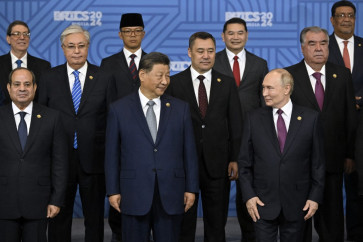33 million left-over men in China lead to marriage conundrum
A couple stands in front of a train of black horses in Southwest China's Chongqing municipality on their wedding day of March 7, 2015
Change text size
Gift Premium Articles
to Anyone
 A couple stands in front of a train of black horses in Southwest China's Chongqing municipality on their wedding day of March 7, 2015. (via China Daily) (via China Daily)
A couple stands in front of a train of black horses in Southwest China's Chongqing municipality on their wedding day of March 7, 2015. (via China Daily) (via China Daily)
A
span class="caption">A couple stands in front of a train of black horses in Southwest China's Chongqing municipality on their wedding day of March 7, 2015. (via China Daily)
Men in Chinese mainland outnumbered women by 33.66 million in a country of more than 1.37 billion by the end of 2015. This imbalance has led to great concern over the difficulty of finding a partner for the left-over men, chinanews.com reported.
According to figures released by China's National Bureau of Statistics on Tuesday, the number of men in the Chinese mainland stands at 704,14 million while the number of their counterparts is 670,48 million by the end of 2015.
For every 113.51 boys born there were 100 girls (the natural rate is 102 to 107 boys to every 100 girls), the data showed.
Through still far beyond the natural rate, China's sex ratio at birth plunged by 2.37 from 115.88 of last year, the biggest drop in the last seven years.
The Chinese government strived to "lower the sex ratio at birth to 115 or below" during 2011-15, as it is proposed in the 12th Five Years Plan for National Population Development.
To balance the population, China further relaxed its more than three-decade-old family planning policy to allow all couples to have two children since the start of 2016.
China, like other countries with Asian cultures, held a historic preference for male offspring over female ones. Conservatives, especially old-fashioned clans in rural areas, regard boys as the only recognized heirs to carry on a family line.
The family planning policy, which was introduced in the 1980s to encourage each couple to have just one child, has pushed the sex ratio at birth up to some degree.
Some families prefer boys if they can only have one child, said Chen Jian, Vice President of China Society of Economic Reform, adding that the gap between sexes at birth will narrow as the two-child policy is implemented.
If the sex gap continues to exist, it will threaten the population ecology and sustainable economic and social development, said Chen.
"The most noticeable impact is a marriage squeeze. Left-over men will find it more difficult to marry women", Chen added.
The sex imbalance will also increase the imbalance of genders in the workplace. "Surplus male labor will intensify the competition in the labor job market and increase the difficulty for women to get a job", said Li Jianxin, professor at Department of Sociology, Peking University.
Even the financial industry may be affected. "The left-over men will drag down businesses like credit card, loan, insurance as well as the credit system", said Yi Fuxian, a researcher on demographic policy at the University of Wisconsin.
In contrast, a balanced sex ratio would boost China's economy.
The implementation of the two-child policy will greatly increase the number of new-born babies, said Wang Peian, deputy head of the National Health and Family Planning Commission.
When they reach working age, the dependency ratio of the population will go down while the potential economic growth rate will go up by about 0.5 percent. Some 30 million individuals are expected to enter the workforce by 2050, Wang added. (kes)









